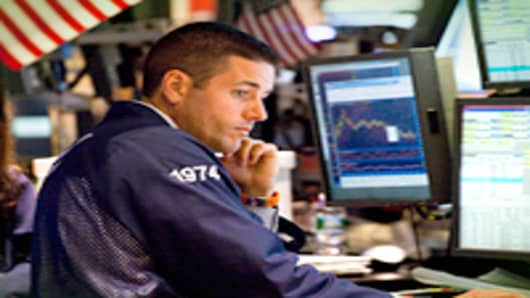Consumer confidence, Fed speakers and home price data are on deck for markets Tuesday, as traders keep their focus on the stream of headlines from Europe.
Stocks bounced Monday, after it appeared European officials were actively discussing ways to try stop the spread of the sovereign debt crisis and strengthen their banking system. The Dow was up 2.5 percent at 11,043, and the S&P 500 rose 2.3 percent to 1,162.
On Tuesday, Greek Prime Minister George Papandreou meets with German Chancellor Angela Merkel at 3 p.m. ET, after he speaks to German business leaders in Berlin.
Economic data includes the S&P/Case-Shiller home price index at 9 a.m. ET, consumer confidence at 10 a.m. and the Richmond Fed survey at 1 p.m. The Treasury auctions $35 billion in 2-year notes at 1 p.m.
"The 2-year is pretty much locked into a pretty tight range. It's really hard to see that that's going to change any time soon. As a consequence, I would think the auction has the potential to be a little on the sloppy side...especially if the stock market continues to firm," said Ward McCarthy, chief financial economist at Jefferies.
As stocks rallied Monday, bond prices fell, driving yields higher. The 10-year was yielding 1.904, its highest yield since last Tuesday, the day before the Fed announced its latest easing program — "operation twist." The 2-year was yielding 0.231 percent Monday.
"You will also get two Fed speakers. One who is a Kool-aid drinker, and that will be Atlanta Fed President Dennis Lockhart, and the other who is drinking the antidote to the Kool-aid, and that would be Dallas Fed President Richard Fisher," said McCarthy.
Lockhart speaks at 12:30 p.m. on the economy in Jacksonville, Fla. Fisher speaks at 1:30 p.m., and his topic is "Explaining Dissent: Why I Voted Against Operation Twist." The "twist" program involves the Fed selling $400 billion in short duration Treasurys that it holds, and buying the same amount in longer duration (6- to 30-year) Treasurys, in an effort to bring down interest rates.
When it released its statement on the "twist" program, the Fed also gave a gloomier assessment of the economy, which spooked markets.
Euro Drama
European officials have been sending mixed messages about their commitment to find remedies for the sovereign crisis, even as they attended G-20 and IMF meetings in Washington this past weekend.
But since Friday, market chatter about a possible bank recapitalization helped lift stocks. The market got a further lift Monday when European Central Bank Executive Board Member Bini Smaghi, speaking in New York, said the European Financial Stability Facility could be used as collateral to borrow from the ECB. The 17 members of the euro zone are currently voting on enhancing the powers of the $440 billion EFSF.
Stocks got another boost Monday after CNBC's Steve Liesman reported that among the options being considered is a fairly detailed plan that would lever EFSF funds. Some of the funds could be used to shore up bank capital.
Liesman reported that EFSF money could be used to seed the European Investment Bank, which would then form a special purpose vehicle to issue bonds and purchase sovereign debt.
"I think the issue over the last year or so has not been the lack of ideas. It's been implementation risk. We've found it kind of ironic how the focus has now shifted to the Cannes (G-20 leaders) meeting on Nov. 4, even before we've gotten Finland, Austria and a couple of others to pass the agreement they announced on July 21," said Robert Sinche, RBS head of global foreign exchange strategy.
Sinche noted the euro's limited response to the reports that sent stocks flying. "There's just not a lot of money to come out of the euro on bad news, and there's not a lot of money to go into the euro on good news," he said. "At this point, I'm sure everyone's seen this move a few times before."
The euro edged just slightly higher, at 1.353 Monday.
He said the market is expecting an ECB rate cut next week. "I think if they don't cut at least 0.25 next week, I would think risk appetite around the world is going to take a big tumble," Sinche said.
Questions? Comments? Email us at marketinsider@cnbc.com



